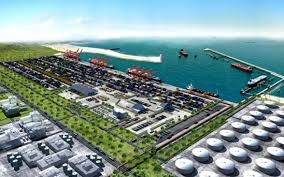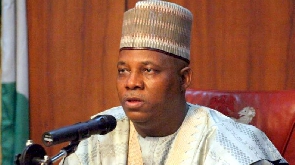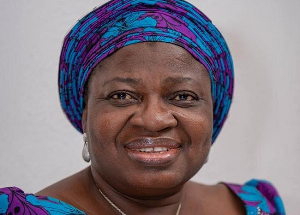The government must prioritize addressing security challenges in the maritime sector to fully utilise the potential of the country’s blue economy, ANOZIE EGOLE writes ...Tap To Read The Full Story Here | ..Tap To Read The Full Story Here...
1.2.2. SEE. VIDEO: MAN. KILLED. MOTHER. FOR .RITUALS
As the country aims to develop the maritime sector as an additional source of revenue alongside the oil and gas sector, safety must be a top priority for the government to achieve this goal.
Maritime operators believed insecurity could pose a major clog to making the best of the country’s blue economy.
On September 2, 10 maritime workers were abducted by suspected kidnappers in Bonny River Waters, sparking widespread fear and uncertainty among workers’ union and their families. The Chairman of the Maritime Workers Union of Nigeria, River Commercial District, Mr Isreal Pepple, told The PUNCH over the weekend that the abducted workers had been released.
“Yes, they have been released, 10 of them have been released. On the issue of ransom, that is the one I don’t know if they were rescued. It would have been in the papers, and if they were not rescued, you should know,” Pepple confirmed.
The operator also believed that those constant security challenges had led to a dramatic reduction in maritime operations, with only a few boats reported in service recently out of about 30 that were previously in service on the route.
Aside from this, there have been constant complaints by truckers of extortion by thugs along the port access roads.
The PUNCH reported in August that truckers under the auspices of the Coalition of Maritime Truck Owners and Allied Services had concluded plans to protest against the vandalism of trucks and the death of their members along the port access roads.
A letter signed by the Public Relations Officer of the coalition, Mordechai Seyi, obtained by The PUNCH, also blamed the ugly incidents on the activities of what they described as state and non-state extortion bandits within and outside the port corridors.
Seyi added those activities had led to an increase in the cost of doing business, saying that the letter intended to inform the public of their decision to embark on a protest.
“Because of the prevalent harsh working environment occasioned by rise in the cost of operations and extortion by members of National Union of Road Transport Workers, Road Transport Employers Association of Nigeria and state extortion bandits, the coalition of maritime truck owners and allied services (made up of over 26 associations & civil society groups) responsible for transportation of the nation’s imports and exports, intends to hold a press conference to inform the general public, the state, and other stakeholders of our decision to protest against the act of vandalism of trucks, extortion, assault, and maiming and death of our drivers arising from the activities of the state and non-state extortion bandits within and outside the ports corridors,” he noted.
However, in a bid to stop the strike, the Nigerian Ports Authority said it was planning to partner with the Lagos State Government and the police to address some of the challenges facing the truckers.
This is coming days after truckers threatened to withdraw their services over constant extortions on the port access roads.
The Managing Director of NPA, Dr Abubakar Dantsoho, disclosed this in a recent statement, after meeting with a group of trucking unions and associations under the auspices of the Association of Maritime Truck Owners in Lagos.
Dantsoho, who was represented at the event by the Executive Director of Marine & Operations, Engr. Olalekan Badmus, said trucking was a critical aspect of maritime logistics.
“We would work with the Lagos State Government and the police high command to urgently address your concerns and prevent any downtime by a critical aspect of the port logistics value chain that the maritime trucking community constitutes. The national economy cannot afford any shutdown at this time,” he said.
Stakeholder speak
The Chairman of the Maritime Workers Union of Nigeria, Rivers Commercial District, Mr Isreal Pepple, while commending the River State Governor, Siminalayi Fabura, for approving the procurement of gunboats to ensure security on waterways, maintained that same attention given to security on the roads should be extended to waterways.
“Let me use this opportunity to commend the governor of River State. He has approved the procurement of six gunboats to man the waterways and ensure more security. It is part of the measure he promised us. I also want to commend the Commanding Officer of FOB Nigerian Navy Bonny, he has fortified the waterways now. He called us for a meeting the other day, and we did our routine inspection,” he stated.
According to him, they noticed that the whole place had been closed off, which had improved security in the area.
“The government needs to do more. For example, the governor is donating 100 vehicles to man the roads compared to the six gunboats he is donating to protect the river. So, the gunboats are inadequate. At least, we are expecting between 20-30 gunboats to man the Rive State waterways. So, there is a need to do more.
“Security is not what is done once, it is a continuous process. But since he has approved six, there is hope that more approvals would be made,” he said.
Also part of the insecurity and hostility along the maritime access road, a trucker, Mr Dike Collins, told our correspondent over the weekend, how his truck driver was assaulted and the truck driven to Oshodi because he refused to be extorted by rogues along the Mile 2 Road, inward the port in Lagos.
In a video shared with our correspondents showed that his truck was arrested because his driver refused to part with N2,000.
“Today, September 12, 2024, we are there because my driver was accosted around 2 am along Fatgbem-Mile 2 Apapa-Oshodi Expressway. The hoodlums demanded N2,000 from the driver, which he declined, and told them he didn’t have much money. In the process, they started assaulting the driver and a task force came and started assaulting the driver and asking him why he was blocking the road. He explained to them that he was not blocking the road and that it was hoodlums that were disturbing him,” he narrated.
According to Collins, it seems the hoodlums were working together with the task force, stressing that as soon as the hoodlums saw the task force, they left.
He added, “The task force members dragged the driver down from the truck and assaulted him. I have been here since 8 am to know what happened. I waited for over two hours for the chairman of the ‘abandoned committee’ to come so that I would know what happened and he didn’t come.
“I managed to find my way into the office of the Lagos State Traffic Management Authority office at Oshodi, to know what happened. They said I should wait for more than four hours for the chairman to come. They prevented me from making calls, and they assaulted me and smashed my phone. They tore my clothes. We don’t know why the state government is using this ‘abandoned committee’ to perpetrate all manner of crimes,” he expounded.
A security expert and President of the Maritime Security Providers Association of Nigeria, Mr Emmanuel Maiguwa, disclosed that there had been seven piracy threats, particularly in Bonny River since May 6, 2024.
“They included five kidnappings, one attempted armed robbery, and one unsuccessful boarding. Notably, five of these incidents have occurred within the last 60 days,” he said.
Maiguwa mentioned that while kidnappings were a maritime issue, they were symptomatic of broader criminal trends.
He attributed the surge in kidnappings to a combination of unemployment, inadequate security infrastructure, and a lack of technological solutions for tracking and identification.
The maritime security expert advocated for the adoption of advanced security measures and socio-economic interventions to address the root causes of criminal behaviour.
Maiguwa also emphasised that while the immediate focus should be on rescuing the kidnapped victims and ensuring their safety, a comprehensive approach involving both security enhancements and socio-economic reforms was crucial for long-term solutions.
“The issue of kidnapping is not unique to maritime settings; it is a general crime occurring in riverine communities. When crimes are committed in these areas, they are not fundamentally different from those happening on land.
“For instance, in places like Bayelsa, where people live on islands and use boats for transportation, the factors leading to kidnapping are similar to those in urban areas.
“Opportunities for legitimate employment are dwindling, which drives individuals toward criminal activities. With the maritime sector once offering numerous opportunities, the current lack of such avenues forces youths to either use their skills in legitimate or illegal ways,” he continued.
According to Maiguwa, technology is crucial for improving maritime security. “Identifying boats, their operators, and other maritime assets is essential. Without proper technology, monitoring and controlling maritime activities remain a challenge”.
Meanwhile, a security expert and a former Senior Special Adviser to Former President Goodluck Jonathan, Olugbenga Oyewole, stated that it was disheartening that the menace was moving from land to sea.
“It is unfortunate that this menace is moving from land to sea. This is essentially an extension of the kidnapping crisis we see on land, with criminals now targeting maritime workers for their potential monetary gains. The spread of this threat is alarming,” Oyewole remarked.
Adopting tech
Maiguwa opined that the International Ship and Port Facility Security Code alone was inadequate for Nigeria’s maritime security needs.
He added that a more comprehensive legal framework was necessary to address and penalise criminal activities within the maritime domain.
“Without this, any increase in land-based criminality will inevitably impact maritime security.
“The Ministry of Marine and Blue Economy should lead efforts to address maritime security challenges, with support from the Ministry of Defence and the Ministry of the Interior. The President should oversee and support these initiatives, while the National Security Adviser should provide advisory support,” he advised.
Meanwhile, Oyewole while criticizing the current strategies for combating maritime crime, stressed the need for technological advancements.
“The failure to use modern technology to track and apprehend kidnappers is a significant issue. The technology available today should allow us to trace and intercept these criminals. The use of communication devices by kidnappers must be traceable, and maritime agencies need to enhance their capabilities to secure our coastlines effectively,” he stated.
He also pointed out systemic issues within maritime security operations, emphasizing the need for improved inter-agency collaboration.
“The lack of effective coordination between agencies like the navy and the police often results in weak prosecutions of maritime criminals. We need seamless data exchange and better cooperation between agencies to address these crimes more efficiently,” Oyewole added.
1.3.4. POPULAR. ACTRESS. SECRET. VIDEO. LEAKED. OUT. GOES VIRAL
Thus, if the government would maximize the country’s plentiful marine resources, a comprehensive strategy must be used to address the security challenge in the sector.▶For More READ THE FULL STORY▶▶



